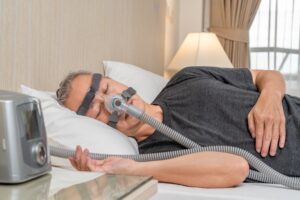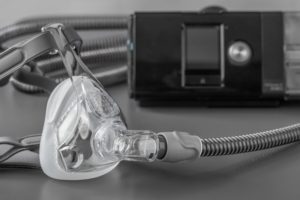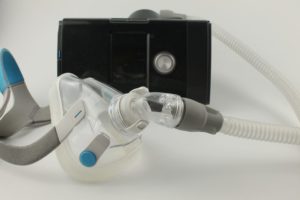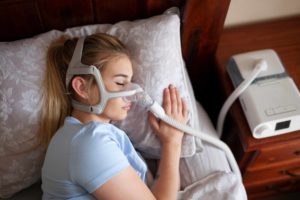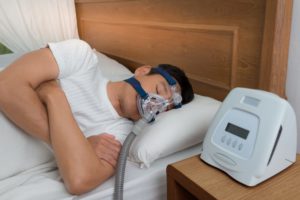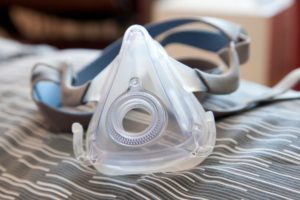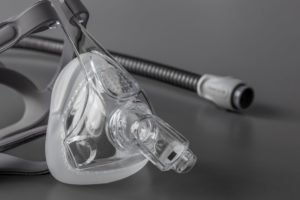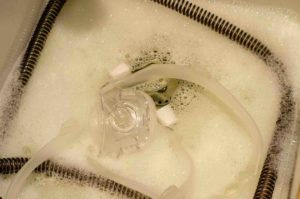Online CPAP Stores That Take Insurance
Steps to Get Coverage
Navigating the world of CPAP machines and accessories can be daunting, especially once you add insurance to the mix. Luckily, there are a few different ways to get the device you need without paying entirely out of pocket — though you might not want to totally discount buying a device without insurance.
If you shop online, you’ll need to do some research to get coverage. First, you’ll need to talk with your insurance provider, whether you have Medicare, Medicaid, or private insurance. You’ll also need to do some sifting through retailers’ FAQs and fine print. Not all sellers make it easy to determine whether or not you’ll get insurance coverage or qualify for reimbursement.
Buying online allows you to compare devices, shop sales, and read real customer reviews. However, it can be tricky to determine whether or not a retailer will work with your insurance. We’ll explain how to choose an online seller and what steps to take to get coverage. You can see our recommended suppliers that take insurance for CPAP here.
Do Online CPAP Retailers Accept Insurance?
All direct-to-consumer online CPAP retailers require a prescription for devices, but very few accept insurance directly. Instead, you’ll purchase supplies out of pocket and apply for reimbursement through your insurance provider. This is generally true for both Medicare and private insurance.
To qualify for Medicare coverage, you must meet certain conditions. You’ll need to provide proof of a sleep apnea diagnosis and that you use the device consistently. Once you meet your Part B deductible, Medicare covers 80% of a 13-month CPAP machine rental and certain accessories like masks and tubing. Medicaid also covers CPAP therapy with similar requirements to Medicare.
Private insurance providers also typically require that you meet your deductible before they will issue reimbursements. For low-deductible plans, this may not be a problem, but those with high deductibles may want to consider getting a CPAP machine through their insurance provider instead of using direct-to-consumer online retailers in case their insurance offers benefits for certain brands or devices.
Like Medicare, going through private insurance usually requires that you rent a machine and adhere to its use to qualify for coverage. Many modern PAP devices send your sleep data directly to your healthcare provider, who can then give it to your insurance company so that they know whether you’re using your device correctly. If you don’t meet adherence guidelines, your provider may refuse to cover your CPAP therapy.
Which Online CPAP Stores Take Insurance?
Very few online CPAP stores work directly with insurance companies, but most will provide you with invoices designed to comply with insurance reimbursement forms. Like other online direct-to-consumer retailers, CPAP stores claim to provide customers with the best deal by cutting out the middleman. In this case, that middleman is your insurance company.
These medical supply companies have a large array of devices and accessories, allowing you to compare different brands, price points, and types of CPAP machines. They also typically have simple online portals that allow you to easily upload prescriptions.
Though most don’t work directly with insurance companies, you may be able to get reimbursed by your provider if you purchase approved devices and supplies. It’s critical to contact your insurance provider before making a purchase to find out what they will approve. Most insurance providers, including Medicare, have specific brands and devices that qualify for coverage, while others won’t be approved.
If you’re looking for help navigating the insurance process, CPAPinsurance.com is a great place to start. The site helps you connect with recommended suppliers to get your CPAP machine and supplies and simplifies the process so you can focus on getting the treatment you need.
There are only a handful of CPAP manufacturers. Most only sell to medical device suppliers and don’t allow individuals to purchase devices directly. However, if you see a device or accessory on a manufacturer’s website that you like, you can read the list of distributors to see where it’s carried or check with your insurance provider to see if they cover the device you’d like to use.
| Source | Considerations |
|---|---|
| Medical Supplier | Medical suppliers offer CPAP devices and accessories from many manufacturers, which lets you compare and contrast products. However, you’ll likely have to make the purchase yourself and then apply for reimbursement. |
| Manufacturer | Most CPAP manufacturers don’t let you buy a device directly. If you do find a company that allows you to purchase supplies or machines, you should contact your insurance company to see if they will reimburse the purchase. |
| Insurance Provider | The best way to get insurance coverage may be to go directly through your insurance provider. This can take guesswork out of the equation and ensure you get the right device, though going through your provider may restrict which machines you can choose. |
How to Use Insurance to Buy CPAP Supplies Online
Despite the differences between insurance plans, your first step should always be to check with your insurance company to see exactly what kind of coverage you qualify for, whether your deductible needs to be met before reimbursement, and which devices and supplies are covered. Then you can decide whether to go the reimbursement route and shop with an online store or to get a device directly through your provider.
Your choices may be limited if you go through your insurance, but there won’t be any surprises regarding what’s covered and what’s not. If you’re opting to buy CPAP supplies online through a direct-to-consumer option, you’ll need to prove that you have a prescription for the supplies you’re buying. Though the exact steps differ by retailer, most include a simple way for your healthcare provider to send a copy of your prescription.
Some accessories like mask liners, CPAP cleaning tools, and non-heated tubing may not require a prescription, but you’ll need a prescription to buy a CPAP device, mask, heated tubing, travel CPAP, and other accessories.
To apply for reimbursement, save any receipts and check with your insurance company ahead of time to learn what’s required. This may include specific billing codes, purchase dates, retailer tax ID numbers, or service codes.
Is It Worth It to Buy a CPAP Machine Out of Pocket?
Some people with sleep apnea find it simpler to forgo insurance and buy a CPAP machine and supplies out of pocket. This isn’t the right choice for everyone, but there are advantages for certain people.
- Those with high deductibles: Many insurance providers don’t cover CPAP therapy until users have hit their deductibles. For some people, this may mean paying up to $8,000 or more before coverage kicks in.
- Shoppers who want product choices: Insurance companies typically don’t let you use whatever device you want, and they only cover certain brands. Those seeking more choices may prefer to skip insurance.
- People who can use FSA or HSA funds: Health savings accounts (HSAs) and flexible spending account (FSAs) policies differ by company, but you can usually use your funds for medical expenses, including CPAP supplies.
- Non-compliant users: CPAP therapy is notoriously tricky to get used to. If you want to use a CPAP device but can’t maintain your insurance provider’s requirements, you can buy one on your own so that you don’t have to adhere to perfect use.






